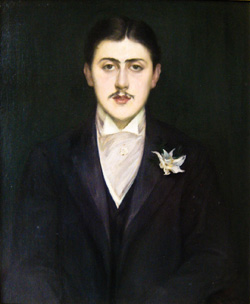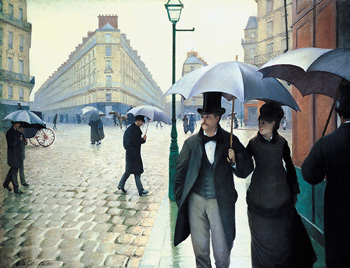
Your complimentary articles
You’ve read one of your four complimentary articles for this month.
You can read four articles free per month. To have complete access to the thousands of philosophy articles on this site, please
Philosophy and Language
To Express It Is To Explain It
Akilesh Ayyar explains Proust’s and Deleuze’s takes on enigmatic messages.
When we ask ourselves why we have a particular feeling or thought, engage in a particular behavior, experience awe or wonder or love, or, perhaps most importantly, suffer emotional pain or pursue self-destructive paths, what kind of answer do we expect? What would it mean to make sense of our inner lives?
There are two main types of answers that might be given: the mechanistic (or naturalistic) and the expressive. Modern science, including psychology and neurobiology, and even psychoanalysis, views the human being as a machine. To explain an emotion, a thought, or a behavior, is to trace the inputs into that machine and the processes that modify those inputs into the mental event, the output. Different scientific schools might focus on different inputs and processes – might conceive the gears of the machine differently. Some might focus on genetics, others on early childhood relationships, still others on cultural norms. Yet in one form or another, the mechanistic view of mind is near universal.
Mechanistic answers can be useful for science; but I find them somewhat unsatisfying in the quest to make sense of my personal life. I need a way to understand myself that does not force me to view myself as a device. I want to keep the mystery and wonder I feel in an emotion or a thought, even as I comprehend something unexpected in it.
There is an alternative to the mechanistic model: the expressive way. We can express our emotions or thoughts or impressions in an artistic medium like the written word or painting. Expression does not simply copy the emotion or thought: it reveals and unfolds something new, and unique to ourselves. Expression is a voyage of discovery, an exploration, just as much as science is. But how does it work? How can we best use expression to blaze forth illumination, wisdom, beauty?
Proustian Expressions

Marcel Proust
The expressive way is best illustrated in the work of France’s supreme literary psychologist, Marcel Proust (1871-1922), in his six-volume magnum opus, In Search of Lost Time (1913). Proust lays out his philosophical views in greatest detail in the final volume of that work, Time Regained.
Proust writes that everything beautiful and desirable sparkles with mystery. Their sparkles, this allure, reveal the existence of messages. But the messages are not within the objects themselves, but within and unique to the observer. The observer who sees something beautiful and longs for it actually needs to find and decode its secret message to him. This is the only way to achieve their desperately-sought satisfaction from the object of desire.
The messages are truths about the world and about ourselves. It is the beauty of these truths that we are trying to capture in possessing an object or person or social position; but this is like someone trying to grasp a cloud in water. It is not there to be had, and in fact, any attempt to seize it simply muddles the image. The more frantic the attempt to seize the cloud, the more impossible it is to see clearly. The only way to truly touch the beauty is to decode the underlying message.
Let’s take as an example Proust’s analysis of romantic love, probably the most painstaking and insightful analysis of it undertaken in any medium. He claims that those who fall in love see in the other person a kind of divinity with which they seek to commune, or a kind of lost paradise which they seek to visit again. In doing so they experience a delicious mystery that they desperately want to possess by owning or controlling the other person. Yet that mystery can never be possessed in this way, because the mystery is within the mind of the lover, not in the body or the reactions of the beloved. This is why love is always filled with pain: because it uses the wrong technique to attain satisfaction. Yet there is another, superior, way: to understand the message hidden within that mysterious love.
The compelling truths within these messages come in various guises. One is the involuntary memory for which Proust is so famous, as when rich landscapes of memories flood back to the narrator when he tastes a madeleine (a cake) dipped in tea. This is a memory awoken by an object. Because the memory comes unsought, this seems to be proof to Proust that this memory is undistorted by self-serving bias, and that it brings back the full context of the past, including the elusive past self who experienced it, for Proust believed that to experience the past fully we need to be the same self we were then. Thus an involuntary memory is far richer and more reliable than a memory voluntarily searched out. Voluntary, deliberate memory cannot summon up the full context and self of the past, only a pale shadow or imitation of it.
But Proust felt the pull of powerful messages in many experiences other than involuntary memories: in the spires of churches as he traveled in a carriage; in trees and nature; in society; and most of all of in romantic love. The powerful impressions these things made on him were, as Proust dubbed them, signs that had to be ‘translated’ into the truths that underlie them. This work of translation is the true vocation of the artist.
Deleuze Interprets Proust
In trying to comprehend Proust, I found most secondary scholarship unhelpful until I came across the seminal work of French philosopher Gilles Deleuze, Proust and Signs (1964).

Amazing what a cup of tea and a cake will do
Neither Proust nor Deleuze ever quite define what a sign is, but I take it to be any particularly striking element of our experience which we strongly desire to possess or understand – any perception, behavior, emotion, thought, or memory standing out from the background which has an air of intrigue and mystery about it. A sign is a lump in the rug of our inner lives. So not Proust’s madeleine itself, but the overall impression it made – its halo of mystery, the sense that something strange lay behind it – was a sign. Similarly, not the narrator’s romantic obsession, Albertine herself, but the overall impression of her little gang of teenagers and the way they blended with the sea – that magical experience was a sign. Ultimately, it was the sign that spurred the narrator to fall in love with Albertine.
Deleuze too notes that meaning does not reside in the physical object or thing that manifests the sign. So, for example, the striking sense of mystery and wonder in the name of an exotic destination – say, the Pyramids – does not reside in the destination itself. Visiting the Pyramids themselves does not yield the secret of the sense of mystery in the name. Similarly, Proust often mentions that we do not fall in love with a real person but with something they evoke in us. In one characteristically memorable passage, he says we are attracted to beautiful people not because of who they are but because of the reflection of the dawn off their faces – that dawn which is youth. Yet we cannot actually possess that dawn by holding its mirror, the body.
However, Deleuze further writes, neither is the meaning of the sign to be found in the memories or chains of ideas evoked by the object. Psychoanalysis is one approach that looks for meaning in such associations. It interprets the response someone gives to an idea by looking for an underlying meaning, perhaps some unpleasant fact the person wishes to guard against seeing.
Understanding these associations may yield some interesting insights, but does not really yield the mystery of the sign. That’s because the meaning of the sign, write Proust and Deleuze, is in the unique perspective of its experiencer. And that unique perspective can be manifested only through artistic expression. Thus the meaning of a sign, its secret message, is revealed in how art may use it to show us our own way of seeing things. The power of a sign, even or especially of an experience of pain or suffering, is therefore an intimation of the future works of art that may be made from it. So a sign is pregnant with meaning. Deleuze wrote that the coiled meaning of the sign was implicated within the sign, and that art uncoiled that meaning. The meaning is coiled up in the sign almost the way that a tree is coiled up in a seed, and art uncoils that meaning, just as, in the right environment – given soil and water and sun and care and time – the tree in the seed uncoils into its above-ground form.
This is in fact a take on a Proustian metaphor. Proust describes the madeleine’s provocation of involuntary memory as comparable to a kind of Japanese folded paper, which, when immersed in water, unrolls and blossoms into different shapes – a woman, a ship, a house, and so on. The messages coiled within a sign are like this. The sign or impression, when immersed in the water of art, expands into its full mature, form.
Keys To Meaning
When someone sees a sign, they are actually seeing the effect of a set of rapid judgments that their mind has made from its unique perspective. These judgments are as subtle and hard to perceive as hieroglyphics nearly effaced from the walls of an ancient tomb. Art inks in and reveals those delicate inscriptions. This act, which Proust called ‘translation’, happens through the artist drawing connections between the powerful, mysterious impression and other things. Proust wanted art to describe what it was like to have an experience, and to find resemblances between it and other experiences. Metaphor is key here, as it is the chief artistic means of showing such connections or resemblances. To call a rabbit a living, trembling handkerchief is interesting because it reveals perhaps hitherto-unrealised connections. To describe metaphorically is to describe the twang of a guitar by comparing it to the sudden gash of color in a flower. Each has its own delightful halo of connotation and complexity; and neither is reduced to sterile abstraction.
Metaphor need not just occur at the word level. A plot may act as a metaphor for experience, as may characters. In non-verbal media, metaphorical connections may also be expressed. In a painting, if certain aspects of a flower are highlighted or otherwise portrayed to show the resemblance of the flower to a young girl, the artist is employing metaphor. All metaphors reveal. And each artist, like each person, sees the world differently, and so draws different connections between things, and so creates personalised metaphors. And each new metaphor an artist creates highlights some aspect of their personality: it is to briefly set a candle burning in front of the vast lens of a distinctive mind, causing that lens to focus on a portion of its infinite complexity for a moment. A chain of metaphors sets an even larger light burning; and a supremely masterful artwork like In Search of Lost Time blazes, and can briefly illuminate the entire universe of the imagination, and triumphantly demonstrate the distinctive voice and personality of an individual such as Proust.
So just how is the artist’s (by which I mean a writer’s, etc, as well as a painter’s) perspective revealed in art? It is revealed, says Deleuze, through style. Two different artists tackling the same subject portray that subject in radically different ways. Artistic style is a product of the choices that the artist makes – what to foreground or background, represent or distort, include or eliminate, or the choices of which connections to assert through metaphor. So when an artist tries to portray a sign in art, it invariably takes on the artist’s signature style, which is the artistic manifestation of the artist’s perspective. The style reveals the self. And through the style is also shown the secret message that the sign whispers, since an intense experience is explained by the art produced from it. A sign is like an encrypted message that the artist decodes using her perspective as a private key. The metaphors and connections in the art expose the particular angle of focus of the rich inner depths of a singular human being by which the decrypted sign is thrown into relief.
Art From Signs
So what is the practical process of generating art from a sign? Proust writes that there can be no hard and fast rules for the translation of signs into messages via art, revealing their truths. He does say, however, that genius involves an ability to follow instinct. This is unfortunately vague, but he seems to mean that, at least initially in the artistic process, what is important is not deliberate, logical analysis, but instead a kind of insight that investigates the sign through a type of intuition. Proust does acknowledge that reason is eventually involved. Nevertheless, Proust says that for a writer or artist, the thinking comes after the initial powerful impression.

Gustave Caillebotte, Paris: A Rainy Day, 1877
Proust also mentions that works of art cannot consist entirely in the elaboration of powerful signs. That would be ideal, but such impressions are too rare for this to be possible. There are major aspects of works of art, then, that are instead deliberately, conscientiously contrived. Yet the choicest morsels in a work of art nevertheless come from the artist’s translation of powerful signs. For this the artist is rewarded not only with truth, but also with what Proust considers to be the only true and pure joy, the joy of significant self-knowledge. This is Proust’s great contribution: to show that the only satisfying explanation of our emotions and thoughts, feelings and behaviors, lies in their expression – their translation into a work of art that reveals the perspective of a mind, the perspective that made the sign, and in this, the meaning of the sign too. By this way of art we can make sense of any mental event, however painful or strange. And it is a method both universal and free.
In the past, I naively believed the artistic description of inner experience to be merely a kind of rote transcription of perception, imagination, or thought. Yet Proust asserts that good art is far from mere copying. He decries mere ‘cinematographic art’ which captures its subjects as a camera would. He wants not literal, isolated descriptions, but the demonstration of resemblances and connections between the object depicted and other things. The key point to the expressive way is that the expression of our inner lives through art and metaphor changes the experience. So we live twice: once in the world of events, and the second time in the world of art; and the second time is by far the more important. To paraphrase Socrates, the unexpressed life is not worth living, since deep examination requires expression. Only when we attempt to portray experiences, and by doing so choose what is important about them, are we forced to see them. And so as the artist attempts to depict it, what starts out as a relatively vague idea, memory or emotion, grows detailed, expands, elaborates, unfolds. It morphs from blurry and vague to complex, rich, interesting, magnificent. This is the explanation that does not explain away: the explanation that yields new information without destroying the precious mystery of experience.
Understanding Regained
Although Proust’s work is about a search for lost time, by ‘lost time’ he did not mean mere memories. Rather, he meant that dimension of ourselves which lies outside of normal time. This is the perspective which shapes our recollected pasts, our anticipated futures, and our present moments alike. So to regain time is to know the unconscious that produces our self – to whose existence involuntary memory certainly attests, but for which it is not the only means of access.

Charles Conder, A holiday at Mentone, 1888
To taste our own singular natures, our unique perspective, is sweet. It is the inexhaustible source of all beauty, and it brings joy. This is the lost paradise within ourselves that we can visit by creating art. Moreover, the expressive way shows that all suffering can be meaningful, and is absolutely necessary for beauty. After all, suffering is the feeling of a limitation, or the sense of a desire denied, and the only things capable of causing us suffering are those things which cause us a certain measure of dissatisfaction or pain as we seek to understand or possess them. And yet we see ourselves only by examining our limitations, in other words, through our pain. Happiness is useful mainly, as Proust remarks, for making suffering all the more palpable and poignant. Suffering is what makes things interesting, and thus makes for signs. Since signs are by definition very interesting experiences, suffering frames nearly every sign; so when suffering is artistically portrayed, it reveals truths. But to be meaningful, suffering must be transformed through art. Its signs must be portrayed. And the specific suffering we endure informs our art in specific ways. Suffering is not generic; it is as absolutely distinctive as the precise block of Carrera marble that Michelangelo used to sculpt David. And the work of art produced from a painful experience reveals exactly the mind that suffers to that degree, in that fashion, from that particular limitation of life. Simple happiness is blindness and sleep – comfortable, but not beautiful. In contrast, the meaning of suffering is the artistic flowering of personal truth, whose roots are in the mud of suffering. This is the great counterintuitive truth Proust presents.
The idea of the Proustian translation of signs takes a mundane world and makes it magical, full of meaning. Everything that is noticed is noticed because of the particular perspective of the one noticing. Each reason for seeing a sign represents a judgment that it was beautiful to see the flux of sensory impressions, this world, in this particular way. Art can unearth the reasons for these judgments and demonstrate their beauty.
When we ask philosophical questions, we do not want pat answers, nor do we want to think that the universe is a machine. We want to explore the enigma of the universe, its deepest mystery, without destroying that mystery. Of course, there is a role for physics, as there is for psychology. A mechanistic model can also act as a useful map. But our deepest desires for explanation are not desires for mechanistic, reductive explanations, but instead are calls for exploration and expression.
In Proust’s scheme, art turns out to be the all-purpose hammer of philosophy. It can translate any mental impression into manifest truth. It is the true alchemy. It effects the metamorphosis of suffering into beauty. It is moreover the only religion that serves theists, atheists and agnostics alike, and it is free, wielded differently by each person, and available to everyone. Anyone can find the thrill of discovering the secret messages that lie within any powerful feeling, thought, memory, or question, by portraying them in art employing metaphor. And as the signs are thus decoded, their beauty is revealed. And each beautiful idea can only be revealed by the particular person that experiences it.
All things hold within their soul some secret world that only the viewer can discover. The winking promise of bliss or mystery is a mirage if chased: it recedes eternally into the distance. The mystery can be entered only by expressing it in art.
© Akilesh Ayyar 2014
Akilesh Ayyar is a writer and attorney in Brooklyn, NY. He blogs at Sifting to the Truth.









